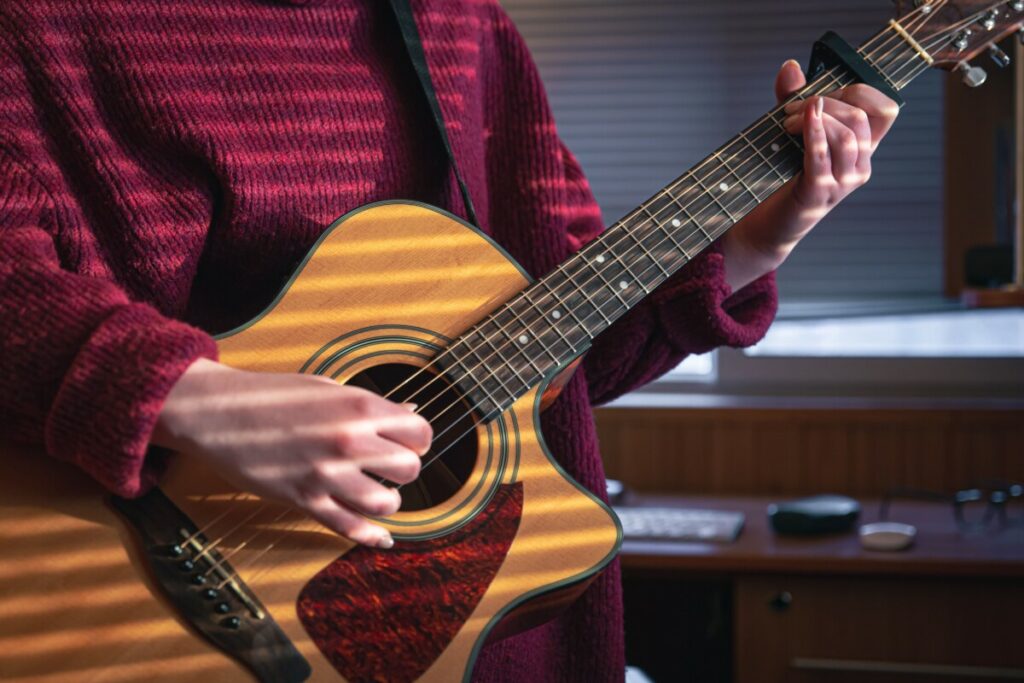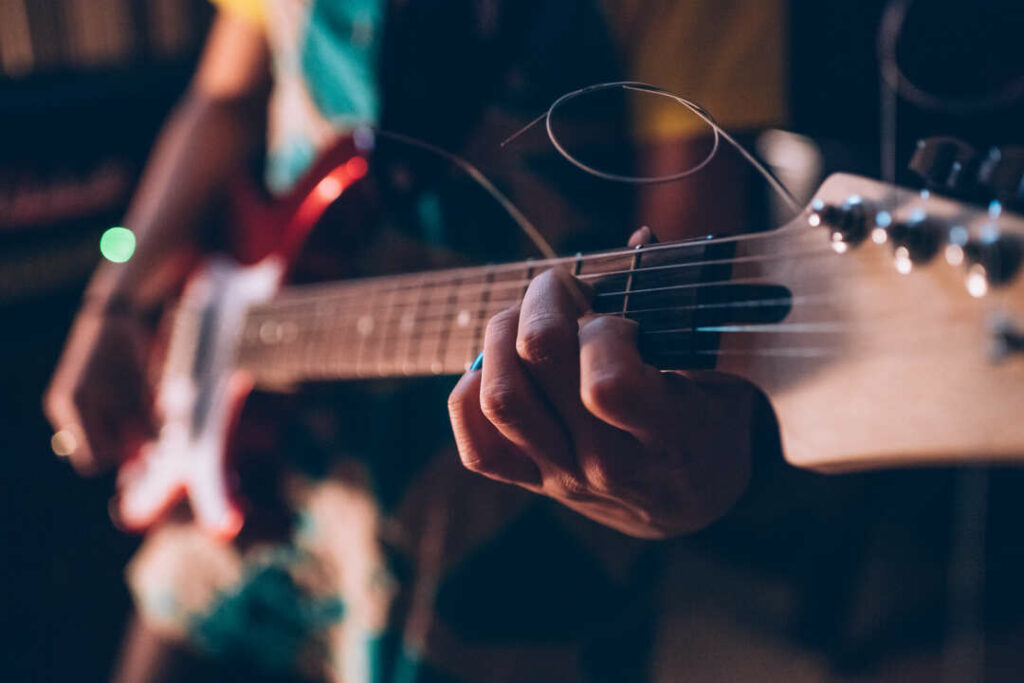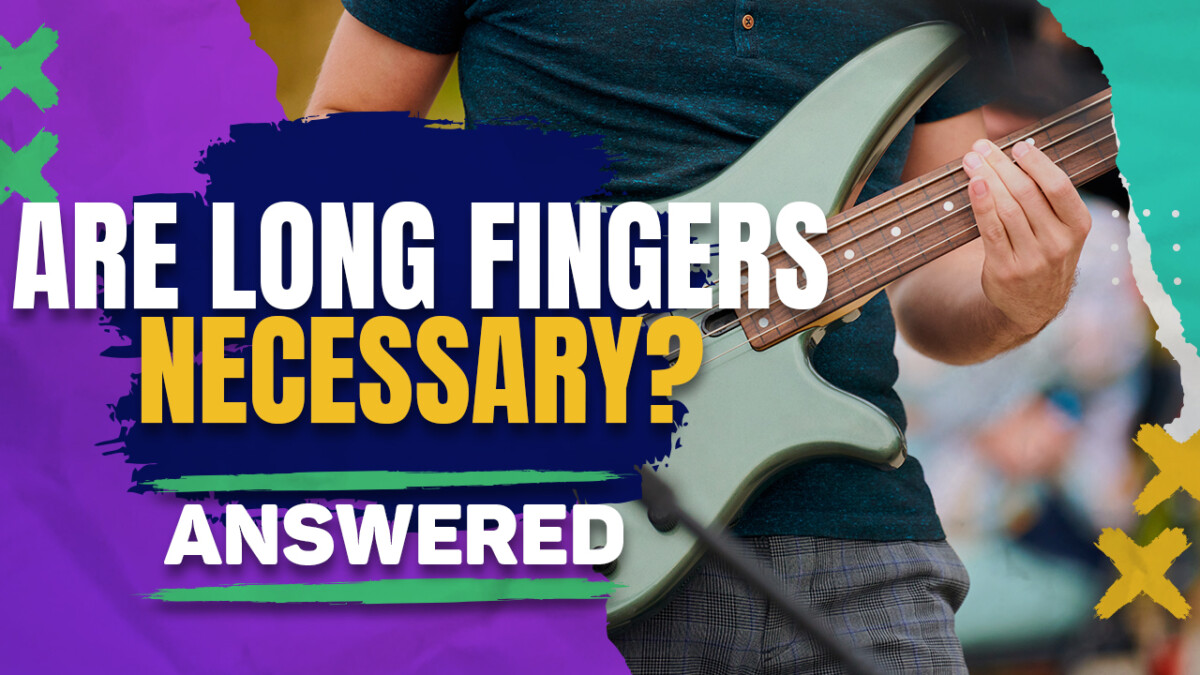Feeling a bit overwhelmed by those guitarists with seemingly endless fingers? Time to kick that intimidation to the curb! Long fingers aren’t a prerequisite for shredding on your six-string – in fact, they can often be more trouble than they’re worth.
But hey, no stress – all you need is some dedicated practice and savvy strategies up your sleeve, and you’ll rock out just fine even if your fingers are on the shorter side. In this piece, we’re going deep into finger length when it comes to strumming strings.
We’ll break down both perks and pitfalls of long-fingered playing styles before exploring alternative techniques tailored towards short-fingered maestros like yourself.
So grab your pick (or fingertips) as we journey back through time for an expansive look at the intricate world of guitar mastery!
Is Finger Length a Guitar Playing Necessity?

No, you do not need longer fingers to play guitar; while longer fingers offer advantages, short-fingered individuals can excel with dedicated practice and strategic techniques.
Rocking the guitar with long fingers definitely has its perks. If you’re one of those lucky individuals blessed with extra length, your playing game is automatically a notch up compared to others sporting smaller fingers.
Think about it like this: longer fingers equal more reach which translates into an enhanced range for striking chords and perfecting picking techniques. It’s pretty much giving yourself a natural boost in playing some kick-ass tunes on that six-string. But wait, there’s more! With these elongated tools at their disposal, guitarists can dive headfirst into complex chord territories where shorter fingered folks might struggle to navigate. Sometimes, you might even consider getting guitar lessons to accomplish some techniques.
And let’s not forget how those rapid-fire transitions between chords become less sweat-breaking when you’ve got lengthy fingers working for ya! Longer fingers are quite literally speed demons aiding accuracy and versatility in your musical journey – from belting out power ballads or shredding through heavy metal riffs – they’re just killer assets to have as a guitarist.
Don’t get me wrong though; shorter fingers aren’t a death sentence by any means — plenty of amazing musicians rock without them! But there’s no denying that having long ones opens doors to certain techniques and makes tackling challenges easier on the fretboard battlefield.
Having longer fingers is on the list of what’s needed to have a successful guitar playing career, well, not exactly although it’s a great advantage for some. So whether it’s fast-paced fingerstyle blues or soulful strumming serenades, having long-fingered dexterity can make all the difference by adding fluidity and finesse— making every performance truly stand out.
Disadvantages of Long Fingers in Guitar Playing
Playing guitar with long fingers? Sure, it has its perks. But let’s get real here; sometimes those long digits can be a pain in the neck – or rather, hand. First off, there’s this annoying tendency for your fingers to press down on the strings incorrectly because they’re just too darn long!
This not only messes up your groovy tunes by causing an irritating buzzing sound but also throws you out of that perfect playing posture you’ve been working so hard to achieve. Sometimes, the tunes get too loud even though you don’t use too much force on the strings. It even comes down to practicing how to play guitar quietly, but that’s not much of a problem for you maybe. Then there are those finger exercises and chord changes. You know what I’m talking about – where speed is key and every split second counts.
That’s when having bigger fingers feels like trying to thread a needle while wearing boxing gloves! They keep getting tangled up with smaller strings making everything slow-motion. Oh, and how could we forget reaching for those elusive strings near the bridge of our guitars?
Some chords feel as distant as Pluto simply because our overgrown phalanges won’t stretch that far! Yes, these challenges exist but knowing them half solves them already.
It’s all about figuring out techniques that work best for us & putting in some consistent practice (and maybe adding a little bit of patience into the mix).
Alternatives to Having Long Fingers for Guitar Playing

If you don’t have long fingers, there are still ways to effectively play the guitar. Finger dexterity is key when playing the guitar, and this can be achieved through various exercises and techniques.
For instance, you can practice hammering-on and pulling-off with your fingers, as well as fretting notes with your thumb. Additionally, you can:
- Use techniques such as hybrid picking and fingerstyle
- Take advantage of guitar effects such as overdrive and delay
- Utilize alternate tunings to make the strings easier to reach
- Practice scales and arpeggios with different fingerings
- Master guitar techniques such as palm muting and bending
Common Challenges for Guitar Players With Short Fingers
The size of your hands can be an absolute pain when it comes to reaching across those tricky chord shapes – there’s nothing more frustrating than not being able to hit certain notes because your fingers just aren’t long enough!
And don’t even get me started on trying to keep up with high-tempo tracks. You could try finger exercises. They’re handy for improving flexibility and strength, but they won’t exactly give you instant results – we’re talking about hours and hours of practice here before any noticeable improvement kicks in.
Also, when you’re working out some complex chords, you might find yourself relying heavily on one or two digits over others which gets exhausting pretty quickly. Just remember that while practicing is essential (and yes, I’m telling you again), it’s equally important not to push too hard and end up straining those precious hands of yours. It’ll take time; it’ll definitely require patience; but if playing guitar is something that truly ignites your passion then these short-finger challenges are merely bumps along the journey towards becoming a masterful musician.
Strategies for Guitar Players With Short Fingers

Playing guitar with short fingers can seem like a daunting task, but don’t worry – you’ve got this. With the right game plan in place, it’s totally doable and I’m here to guide you through it.
Keep in mind to consider various tactics such as finger workouts, mastering hand placement and finding a smaller sized guitar that complements your hand size.
Plus, exploring methods of learning songs tailored specifically for your unique needs and dabbling in alternate fingering techniques will boost your skills substantially.
Ready? Here are five killer tips to slay the fretboard with short fingers:
- Adjust the guitar’s action to a higher level
- Practice alternate chord shapes and fingerings
- Strengthen your fingers with finger exercises
- Use a capo to move chords up the neck
- Choose a guitar with a smaller neck width
Conclusion
One might quickly jump to the conclusion that long fingers are a crucial requirement for mastering guitar playing, but it’s not as black and white. Yes, longer digits can have their perks, but short-fingered people aren’t without options or techniques.
At the end of the day, it’s less about your finger length and more about your burning passion and relentless commitment.
These are indeed quintessential in navigating through this musical journey irrespective of any physical constraints like finger size. So don’t let hand dimensions shackle you from chasing your dreams; armed with unwavering determination,you’re unstoppable!

